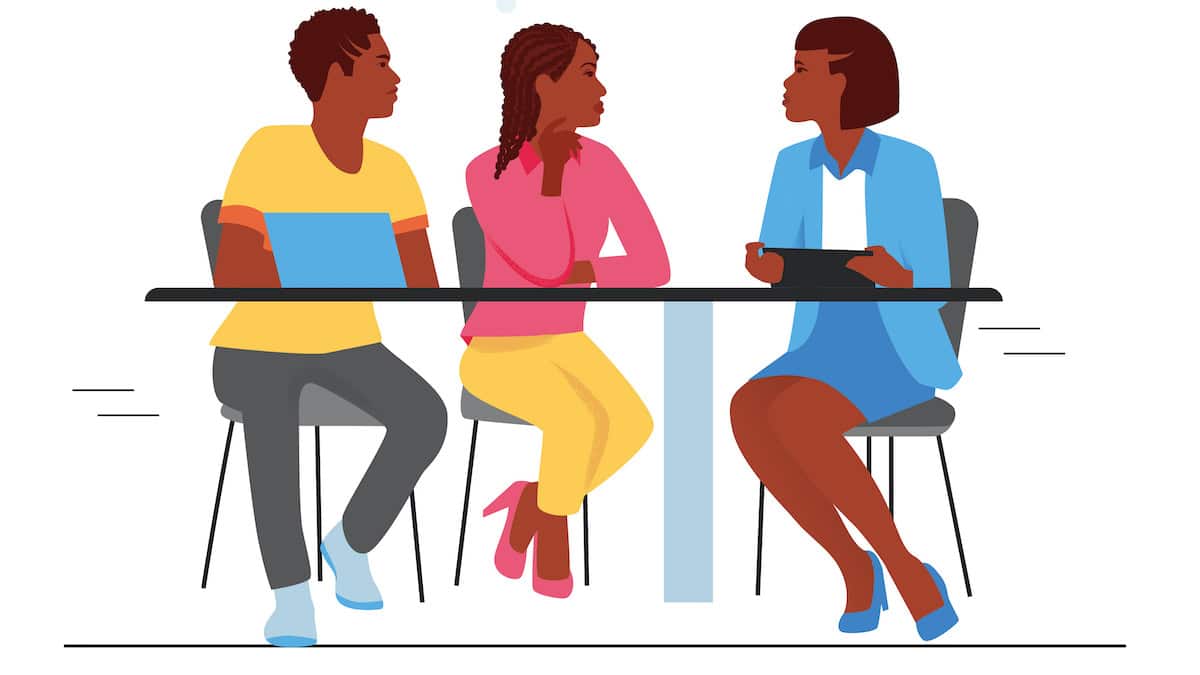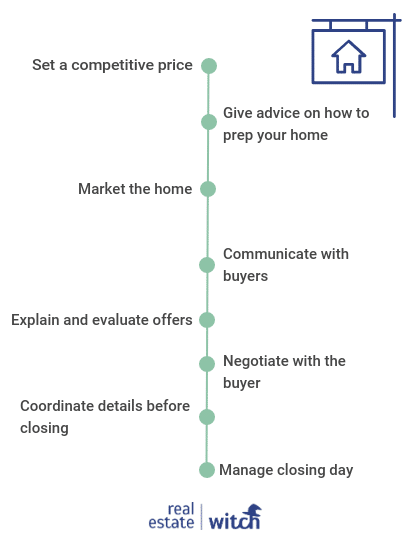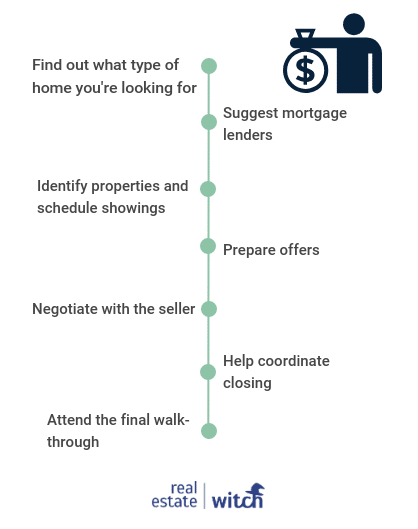
Published
What agents do for sellers | What agents do for buyers | Interesting facts about agents | Who do agents work for? | Dual agency | FAQs | Why you should trust us
Real estate agents are licensed professionals who can represent you when you buy or sell a home.
A real estate agent’s responsibilities include:
- Listing homes on the Multiple Listing Service (for sellers)
- Finding suitable homes (for buyers)
- Advising homeowners/buyers on a home’s overall condition
- Preparing paperwork
- Negotiating
- Communicating with escrow agent, title company, mortgage lender, and other parties prior to closing
Successful real estate agents help people buy and sell homes for a living, so they’re true real estate experts. Experienced agents know what questions to ask, what details to look for in a home, and how to ensure you get the best possible deal.
Realtors earn commission for their services — usually a fixed percentage of the final sale price. Listing agents usually charge 5–6%, which they split with the buyer’s agent. Commission is taken from the proceeds of the sale after a home sells.
🔑 Key takeaways
- The two types of real estate agents are listing agents (agents who represent sellers) and buyer’s agents (agents who represent buyers).
- Real estate agents perform a variety of duties for their clients — from scheduling showings to handling offers to organizing closing.
- Most people work with real estate agents because agents can help explain your entire transaction and protect you from costly mistakes. Real estate agents earn commission (a percentage of the final sale price) for their services.
What do real estate agents do for sellers?

Real estate agents who represent sellers, also known as listing agents, help find a buyer for your home and make sure your sale closes without any problems.
When you’re ready to sell your home, your real estate agent will:
- Set a competitive price
- Give advice on how to prepare your home for sale
- Market your home
- Communicate with buyers or buyer’s agents
- Explain and evaluate offers
- Negotiate with the buyer and draft a purchase agreement
- Coordinate details before closing
- Manage closing day
A listing agent’s responsibilities start the moment you sign a listing agreement — the legally binding contract between a seller and an agent.
Listing agents usually charge 5–6% of the final sale price in commission. This fee is taken from the proceeds when you sell your home, so you don’t have to pay anything upfront.
Your listing agent will split the commission with the buyer’s agent. This encourages buyer’s agents to show your home to their clients.
Set a competitive price
Real estate agents use recent sales data and their real estate expertise to set a competitive listing price for your home.
To determine the best price, agents do a comparative market analysis (CMA). A CMA uses sale prices from comparable homes (“comps”) in your neighborhood or the surrounding community.
Sale prices can give your agent a ballpark idea of how much your home is worth, but they also have to factor in the unique features of your home before they establish a competitive price. Recent renovations, extra square footage, or outdated features could make the listing price higher or lower than comps in your neighborhood.
Home sellers who work without a real estate agent often make the mistake of overpricing or underpricing.
- Overpricing your home could make it much harder to sell.
- Underpricing your home could cause you to sell for less than the property is worth and miss out on thousands of dollars.
✍ Note: Top real estate agents don’t tell you what you want to hear — they tell you the truth. The best realtor for you isn’t necessarily the one who suggests the highest listing price for your home.
Give advice on how to prepare your home for sale
Local realtors know what features buyers want most in a house, and how quickly they’re willing to make an offer.
Your agent can walk through your home before you list it and tell you if you should do any repairs or renovations, or if you should try selling as is.
For example, you might assume you need to install new flooring before you list your home, which could cost thousands of dollars.
A knowledgeable real estate agent might point out that houses in your neighborhood are selling quickly without any repairs or upgrades, so it might not be worth spending money on major upgrades like new flooring.
Market your home
Your realtor might hire a professional photographer to capture your home in its best light, or they might even take pictures themselves.
Agents use these images and all of the information you can provide as a homeowner to create a listing on the Multiple Listing Service (MLS) — the online database where homes are listed for sale. Only real estate agents can list homes on the MLS.
Listing on the MLS makes it easier for potential buyers to find your home and learn more about it before they book a showing, but it’s only the first step.
Your real estate agents might use other strategies to market your home, including:
- Putting up signs in your yard and around your neighborhood
- Staging your house to make it look more appealing
- Hosting an open house
- Sending out notifications to other local realtors
- Advertising the listing on social media
Communicate with buyers or buyer’s agents
Your listing agent will communicate with buyer’s agents (or unrepresented buyers) to answer questions about your house, schedule showings, and negotiate on your behalf.
It’s important to allow your realtor to communicate for you because they’ll be able to keep some distance between you and the buyer.
As a home seller, you’re too emotionally invested in the sale of your home to be the main point of contact. You might not conduct yourself in the most professional manner when a potential buyer:
- Makes an offer that’s lower than you expected
- Criticizes the state of your home
- Request repairs you don’t want to agree to
Your agent can communicate in these situations and give you advice about how to respond — making it more likely that you’ll be able to reach an agreement with the buyer.
Explain and evaluate offers
When you get an offer from a prospective buyer, your listing agent will present it to you and explain what it means.
Your agent can help you decide if you’re satisfied with the amount of the offer, and evaluate all of the terms the buyer is asking for.
Details to notice when someone makes an offer
| blank | blank |
|---|---|
| ✔ Contingencies | Common contingencies include financing, home inspection, and appraisal. |
| 🏦 Financing | The type of financing the buyer is using matters because some types are more reliable than others. For example, a conventional loan is more likely to close than a government loan. |
| 📅 Closing date | If your priority as a seller is to move out quickly, a short closing window could make the offer more appealing to you. |
You can accept, reject, or counter the offer after you’ve had the chance to talk it over with your realtor. Your listing agent will communicate your response to the buyer.
Negotiate with the buyer and draft a purchase agreement
Once you accept an offer from a buyer, your listing agent will draft a purchase agreement — a document that includes all of the details of the sale, such as:
- Who’s buying the home
- What’s included with the property
- Who’s paying various closing costs
Your agent will make sure everyone signs the agreement, and then it’s the buyer’s responsibility to start meeting their contingencies.
The agent may need to continue negotiating on your behalf to finalize details before closing. For example, if the home inspection reveals damage the buyer wasn’t aware of, the buyer may ask you to pay for repairs before closing, or offer money so they can fix it themselves.
Coordinate details before closing
Before closing day, your listing agent will make sure you’ve made any repairs you agreed to complete for the buyer, and all of your belongings are moved out of the house.
If the buyer makes any last minute changes or requests your agent will tell you and make sure the situation is resolved as quickly as possible.
Your agent will also make sure an escrow account is ready to receive funds from the buyer and their lender on closing day.
Funds are usually sent by the buyer and/or their lender on closing day, and you’ll have your profits from the sale in 1–4 business days, depending on what state you live in.
Manage closing day
Your listing agent will attend the closing and review all of the documents, such as the closing statement, to ensure they’re accurate and complete.
The realtor will also verify the proceeds of the sale are sent to you once all of the deductions for closing costs, commission, and other expenses have been accounted for.
This is when your agent finally gets paid.
Listing agents typically charge 5–6%, which they split with the buyer’s agent. Both agents split their commission from the sale with their broker.
For example, on the sale of a $300,000 home, 6% commission would equal $18,000.
| numbers | dollars |
|---|---|
| Purchase price | $300,000 |
| Buyer's agent (1.5%) | $4,500 |
| Buyer's broker (1.5%) | $4,500 |
| Seller's agent (1.5%) | $4,500 |
| Seller's broker (1.5%) | $4,500 |
| Total commission (6%) | $18,000 |
What do real estate agents do for buyers?

A buyer’s agent can help you find and purchase a home that matches your budget and preferences.
When you’re ready to buy a home, a real estate agent can:
- Find out what type of home you’re looking for
- Suggest mortgage lenders
- Identify properties and schedule showings
- Prepare offers
- Negotiate with the seller
- Help coordinate closing
- Attend the final walk-through
There’s no out-of-pocket cost if you want to work with an agent when you’re buying.
A buyer’s agent typically earns commission from the proceeds of the sale (usually 2.5–3%), which they split with their broker.
Find out what type of home you’re looking for
One of your agent’s most important responsibilities is to understand the type of home you’re looking for. This information helps a buyer’s agent narrow down their search.
For example, if your budget is $300,000 and you absolutely need a house with a garage, the agent might limit their search to homes that meet those criteria.
Your realtor will speak to you before you start touring homes to learn more about:
- Your budget
- What neighborhoods you’re interested in
- What amenities you’re interested in
- The size and style of home you prefer
Suggest mortgage lenders
If you haven’t already been pre-approved for a mortgage, your realtor might suggest some lenders who you can talk to.
Pre-approval is basically an informal “yes” from a mortgage lender saying they’ll loan you a certain amount of money. Without pre-approval it might be difficult for you or your agent to know your budget.
Many agents have relationships with mortgage lenders, which can be a great first step if you need to speak to someone about financing. You can also shop around to compare rates from other mortgage lenders if you have time.
✍ Note: A buyer’s agent may be hesitant to continue showing you homes until they know you’re pre-approved for a mortgage. Agents often see buyers who aren’t qualified for financing as a potential waste of their time.
Identify properties and schedule showings
Your agent will start giving you tours of houses once they know what you’re looking for and what you can afford.
You can ask your realtor to show you houses you found through your online search, but they might also show you other listings they know of that match your criteria.
Before you go to a showing with your agent, they can get more information about the property from the listing agent, including property tax rates and utility bills. As you tour the home, your agent can answer questions, point out unique features, and help you understand possible repair issues.
After you tour a house, your agent can follow up with the listing agent to get answers to any other questions you might have.
🤓 Quick tip: It’s important to let your agent schedule showings of multiple houses — even ones you didn’t request a tour of. The more houses you see, the easier it’ll be to comparison shop and pick one that’s the best fit for your situation.
Prepare offers
When you find a home you’re interested in purchasing, your real estate agent can advise you on what to include in your offer, including:
- Price
- Contingencies
- Fixtures (additional items in the home you’d like to include in the sale, like furniture)
- Closing date
As you’re putting together an offer, your agent might advise you how to make it more attractive to the seller — particularly if you’re buying in a competitive market.
For example, if you want to make an offer that’s below the listing price, your agent might suggest specifying a closing date that’s faster than the typical local closing time.
Negotiate with the seller
Your realtor will speak to the seller or the seller’s agent (usually within 24 hours) to find out whether or not the seller has accepted your offer.
The seller might respond with a counteroffer and request a higher purchase price or different contract terms.
At this point, your agent can help you decide if you want to keep pursuing the deal. If you do, they’ll negotiate on your behalf until an agreement is reached.
When the seller accepts your offer, the listing agent will draft a purchase agreement for you to sign.
Help coordinate closing
Once your offer has been accepted, it’s your agent’s job to get you to closing day, which means they have to make sure all of the contingencies in your offer are met.
For example, your agent might help you find a home inspector so you can check your home inspection contingency off the list of things to do before closing.
Your realtor will also make sure you finalize your mortgage financing so all of the costs of your sale are covered on closing day.
» MORE: How Much Are Closing Costs?
Attend the final walk-through
On closing day, you’ll walk through your new home with your realtor to make sure it’s in the condition you agreed to purchase it in. This might include:
- Checking to see if the seller completed the repairs they agreed to
- Making sure all of the seller’s belongings have been removed from the property
During the walk-through, your real estate agent can take note of anything that’s out of place, and act as a witness if there’s anything you might need to dispute with the seller. If you uncover any issues, the closing could be delayed or you might even have to back out of the sale.
Assuming your final walk-through is uneventful, you’ll close on your new home and your realtor will be paid from the proceeds of the sale.
Interesting facts about real estate agents
| facts |
|---|
| 💼 Real estate agents are licensed by their state to assist people who are buying and selling property. |
| 👥 Some agents work exclusively with buyers or sellers, while others represent both. |
| 📊 88% of buyers and 89% of sellers use an agent. |
| 💰 Real estate agents split commission with their broker, and with the other agent in the transaction. This means most agents only take home about 1.5% of the sale price. |
Who does a real estate agent work for?
All real estate agents are affiliated with a real estate brokerage, like RE/MAX, Century 21, or Keller Williams. These brokerages provide agents with marketing materials and administrative support.
Agents are legally required to be sponsored by a licensed real estate broker, a professional who manages a real estate brokerage and can oversee transactions to ensure compliance with state and federal laws.
Only real estate agents who have earned a broker’s license are allowed to operate independently.
Most agents aren’t paid a salary by a brokerage. Instead, they earn commission when they help buy or sell a home. This commission gets split with their broker.
Discount brokerages like Redfin are an exception because they pay their agents a base salary, plus bonuses based on the number of transactions they complete.
Can a real estate agent represent the buyer and the seller?
In some states, a real estate agent can represent the buyer and seller in the same transaction — this is called dual agency.
Dual agency is only legal in eight states: Alaska, Colorado, Florida, Kansas, Oklahoma, Texas, Vermont, and Wyoming.
Even in states where dual agency is legal, it’s usually not a good idea because it puts the real estate agent in a tough position: they can’t possibly represent the best interests of both parties.
FAQs
What does a real estate agent do?
Real estate agents assist home buyers and sellers with every part of a real estate transaction.
Agents do things like:
- Market houses for sellers
- Show houses to buyers
- Negotiate
- Prepare offers and closing documents
Check out the full list to learn more about what real estate agents do for home buyers and sellers.
Do I need a real estate agent?
It's advisable to work with a real estate agent since they can walk you through the entire process of buying or selling a home — helping you to understand what you're doing and avoid making a mistake along the way.
Companies like Clever can even connect you with a top-rated agent in your area and help you save thousands of dollars on realtor commissions.
Why you should trust us
The Real Estate Witch team interviewed real estate agents, real estate entrepreneurs, and actual home buyers and sellers to learn more about what real estate agents do.
These conversations gave us clear insight into the core responsibilities of a realtor.
If you'd like to learn more about what it takes to find or select the best real estate agent in your area, check out our complete guides.
» How to Find a Real Estate Agent | » How to Choose a Real Estate Agent
Related articles
Questions to Ask a Realtor: Learn how to interview a real estate agent before you hire them.
Do I Need a Real Estate Agent?: Get more information about how agents can help you when you're buying or selling your next home, and what it really costs to work without one.
How Much Does Selling FSBO Cost?: Selling your house on your own might seem like the cheapest option, but there are still a lot of expenses involved. See a full breakdown of FSBO costs.


Leave a Reply